By Roy Maconachie,Thomas Kjeldsen and Lee Bryant
In many African countries, the artisanal and small-scale gold mining sector is largely informal, generating pressing environmental and health impacts. Together with colleagues (Dr Solomon Gbanie, Kabba Bangura and Anthony Kamara) from the Department of Geography at Fourah Bay College (FBC), University of Sierra Leone, Drs Roy Maconachie (SPS), Lee Bryant (ACE) and Thomas Kjeldsen (ACE) are investigating the impact of artisanal gold mining on water quality in the Sula Mountain region of central Sierra Leone.
Sierra Leone is one of the world’s poorest countries, ranking 181 out of 188 countries on the UNDP Human Development Index. Decades of economic decline, 11 years of armed conflict, and more recently, an Ebola crisis, have had a catastrophic impact on local livelihoods and the economy. Poverty remains widespread, with more than 60% of the population living on less than £1/day and some 70% of youth being unemployed. Over the past two decades, the rise in the price of gold has resulted in the growth of informal artisanal and small-scale mining (ASM): low tech, labour-intensive mineral extraction and processing that employs rudimentary tools and has low barriers to entry for poor people. While the livelihood benefits of the ASM sector are largely undisputed, policies and programmes aimed at minimising its environmental footprint have to date had limited success.
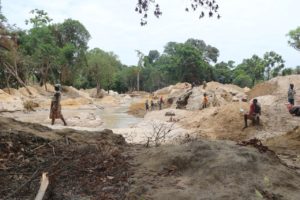
One of five project study sites in Sierra Leone (Photo: Solomon Gbanie, 2019)
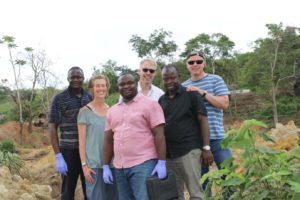
Team visiting field site (from left: Kabba Bangura, Lee Bryant, ‘Chief’ Tony Kamara, Thomas Kjeldsen, Solomon Gbanie, Roy Maconachie)
The environmental and health impacts of small-scale gold mining sector include land degradation, the contamination of water resources, and in some cases, the uncontrolled use of toxic chemicals such as mercury and cyanide. Although mercury provides miners with a cheap and easy way of extracting gold from ore through the process of amalgamation and distillation, is has severe neurological and health effects, particularly in unborn children and infants. Estimates suggest that the artisanal gold mining sector constitutes 37% of the global anthropogenic atmospheric mercury emissions to the environment.
Thanks to funding from the GCRF, the University of Bath team visited Sierra Leone in January 2019. The aim of the visit was to identify active artisanal gold mining sites where water quality measurements and qualitative social surveys could be carried out, and to teach the local FBC team how to use water quality monitoring equipment. Over the following five months, the FBC team spent ~one week/month in the field, performing field sampling and monitoring at the five study sites as well as interviewing more than 100 miners to explore their concerns about water quality aspects of the mining activities. Water quality was sampled upstream, adjacent to, and downstream at each site, and samples of both water and sediment were collected and transported back to Freetown for more detailed chemical analyses.
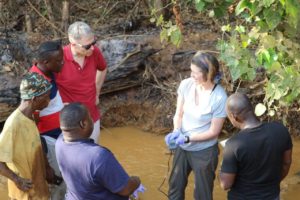
Dr Lee Bryant demonstrating use of an electrical conductivity probe. (photo: Roy Maconachie, 2019)
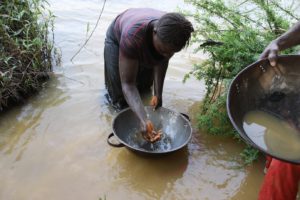
Manual extraction of gold from a gravel sample using a pan. (photo: Roy Maconachie, 2019)
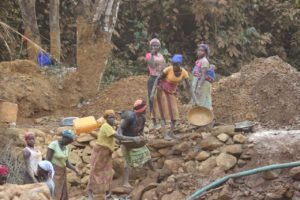
Gold mining is a female-dominated activity in Sierra Leone (photo: Roy Maconachie, 2019)
A second visit to Sierra Leone took place in early June 2019, during which the entire project team (UoB and FBC) visited the field sites, and reviewed the substantial and exciting dataset collected during the full six-month field campaign. This was followed by a research engagement workshop organised in Freetown, where initial results were discussed and a roadmap was developed for extending the current study to a larger regional scale. Plans are currently being developed for a comparative project involving partners from neighbouring countries in West Africa (e.g., Ghana) where artisanal mining is a more mature activity and the use of mercury is established and widespread.
The data collected during the six month field campaign is currently being analysed and a paper is in development for submission to an interdisciplinary scientific journal. We have also been in conversation with the United Nations Institute for Training and Research (UNITAR), who have been working closely with the Environment Protection Agency (EPA) of Sierra Leone to execute a National Action Plan (NAP) for reducing mercury use in artisanal and small-scale gold mining. UNITAR have expressed considerable interest in our research, which aligns very closely with the drafting of the NAP, and they have invited us to contribute to this process going forward.
The entire team would like to acknowledge and express our gratitude to the University of Bath GCRF grant from Research England for funding this project.
Sign up to CDS newsletter for all our latest blog posts and news. Please find the link here.
Responses
It's really a nice literature, I just hope that some of these impacts are response to in a timely manner.